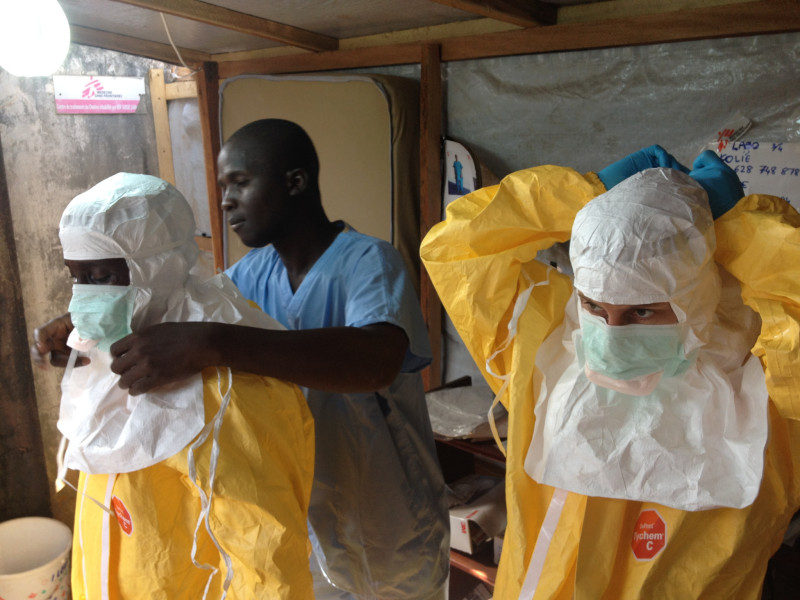Lawrence Gostin, director of WHO's Collaborating Center on Public Health Law and Human Rights at Georgetown University, said it was inexcusable that a company without the required expertise to respond to an outbreak was given such fundamental responsibilities.
"It was a comedy of errors," he said, adding that WHO was ultimately to blame for allowing the situation to unravel.
"WHO knew that this company was bungling the response and they did nothing," Gostin said. "In any other context, that would be called a cover-up."
WHO officials did not return messages seeking comment on the AP story.
Metabiota's chief executive officer and founder, Nathan Wolfe, said there was no evidence that his company was responsible for the lab blunders.
He added that the reported squabbles were overblown and that any predictions made by his employees who were on loan to the Sierra Leonean government didn't reflect the company's position. Metabiota doesn't specialize in outbreak response, he said, but volunteered its staff and resources to Sierra Leone at a cost to his company of about $500,000.
"We are incredibly proud about everything they did," he said at an interview in his office Thursday. "These are individuals who took substantial personal risk and worked incredibly long hours."
Metabiota bills itself as a pioneer in tracking emerging viral threats and says it works to "improve the world's resilience to epidemics." The firm and its nonprofit sister company, Global Viral, have received millions from the U.S. Department of Defense, USAID, Google and the California-based Skoll Foundation.
In the early months of the 2014 Ebola outbreak, with WHO and partners thin on the ground, authorities in Sierra Leone turned to Metabiota to help respond to the epidemic in Kenema. The company had been in the country since 2009 and supported the government on issues including outbreak investigation and laboratory work.
At first, Metabiota appeared to be doing well. According to an account on its website, company staffers helped to train hundreds of health workers under the guidance of WHO.
But within weeks, the virus spread across the country and, as the death toll mounted, experts began questioning the work being done at the lab in Kenema shared by Metabiota and Tulane, which had its own longstanding project researching Lassa fever and other diseases.
When Gary Kobinger, head of special pathogens at the Public Health Agency of Canada, double-checked some of the facility's work in mid-July, he found worrying discrepancies in four of eight tests and identified as many as five people wrongly diagnosed with Ebola, according to emails obtained by AP.
"If you detect two, three, four, five, how many are out there?" Kobinger said in an interview.
The mistakes sparked concern about bigger problems in the lab — worries relayed all the way up to WHO Director-General Dr. Margaret Chan. When U. S. health official Austin Demby inspected the facility, he found a mess.
"The cross contamination potential is huge and quite frankly unacceptable," he wrote in late July.
Metabiota founder Wolfe said "we did wonderful lab work as far as I'm concerned." He said errors in the shared facility stopped once "other groups" were pulled from Ebola testing.
Documents show that Metabiota and Tulane blamed each other for the mistakes.
But Metabiota was criticized elsewhere too. The firm's employees were "systematically obstructing any attempt to improve the existing surveillance system," WHO Ebola coordinator Philippe Barboza said in an August 8, 2014, email. Another WHO employee, Mikiko Senga, photographed a Metabiota presentation that described the outbreak in Kenema as "stabilizing."
"They are sending wrong messages," she said. "The outbreak is clearly not stabilizing."
Metabiota's problems mirror the wider mismanagement that hamstrung the world's response to Ebola, which has killed more than 11,000 people. Previous AP reporting has shown that WHO resisted sounding the alarm over Ebola for two months on political, religious and economic grounds and failed to put together a decisive response even after the alert was issued.
WHO since has promised reforms.
As for Metabiota, Wolfe's firm has largely been congratulated on its work in West Africa. Last year, the company raised some $30 million in investment intended to support their epidemic projects.
